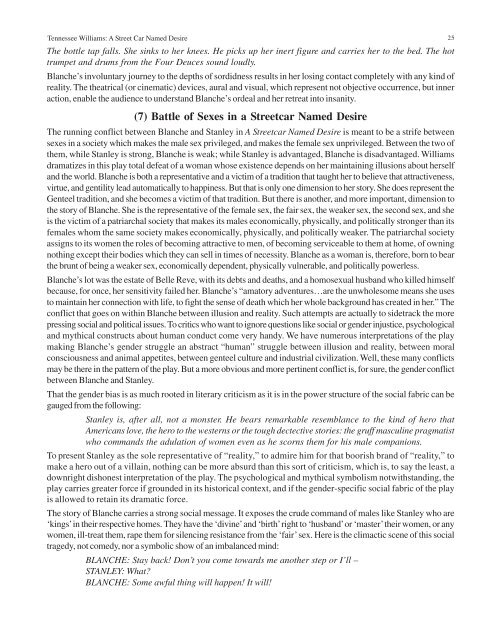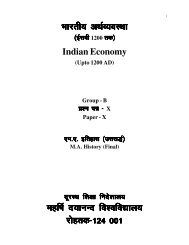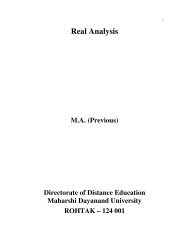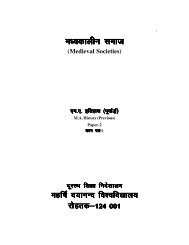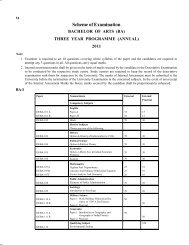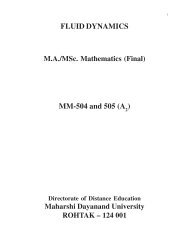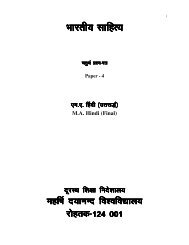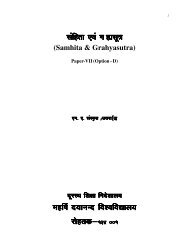LITERATURE AND GENDER - Maharshi Dayanand University, Rohtak
LITERATURE AND GENDER - Maharshi Dayanand University, Rohtak
LITERATURE AND GENDER - Maharshi Dayanand University, Rohtak
Create successful ePaper yourself
Turn your PDF publications into a flip-book with our unique Google optimized e-Paper software.
Tennessee Williams: A Street Car Named DesireThe bottle tap falls. She sinks to her knees. He picks up her inert figure and carries her to the bed. The hottrumpet and drums from the Four Deuces sound loudly.Blanche’s involuntary journey to the depths of sordidness results in her losing contact completely with any kind ofreality. The theatrical (or cinematic) devices, aural and visual, which represent not objective occurrence, but inneraction, enable the audience to understand Blanche’s ordeal and her retreat into insanity.(7) Battle of Sexes in a Streetcar Named DesireThe running conflict between Blanche and Stanley in A Streetcar Named Desire is meant to be a strife betweensexes in a society which makes the male sex privileged, and makes the female sex unprivileged. Between the two ofthem, while Stanley is strong, Blanche is weak; while Stanley is advantaged, Blanche is disadvantaged. Williamsdramatizes in this play total defeat of a woman whose existence depends on her maintaining illusions about herselfand the world. Blanche is both a representative and a victim of a tradition that taught her to believe that attractiveness,virtue, and gentility lead automatically to happiness. But that is only one dimension to her story. She does represent theGenteel tradition, and she becomes a victim of that tradition. But there is another, and more important, dimension tothe story of Blanche. She is the representative of the female sex, the fair sex, the weaker sex, the second sex, and sheis the victim of a patriarchal society that makes its males economically, physically, and politically stronger than itsfemales whom the same society makes economically, physically, and politically weaker. The patriarchal societyassigns to its women the roles of becoming attractive to men, of becoming serviceable to them at home, of owningnothing except their bodies which they can sell in times of necessity. Blanche as a woman is, therefore, born to bearthe brunt of being a weaker sex, economically dependent, physically vulnerable, and politically powerless.Blanche’s lot was the estate of Belle Reve, with its debts and deaths, and a homosexual husband who killed himselfbecause, for once, her sensitivity failed her. Blanche’s “amatory adventures…are the unwholesome means she usesto maintain her connection with life, to fight the sense of death which her whole background has created in her.” Theconflict that goes on within Blanche between illusion and reality. Such attempts are actually to sidetrack the morepressing social and political issues. To critics who want to ignore questions like social or gender injustice, psychologicaland mythical constructs about human conduct come very handy. We have numerous interpretations of the playmaking Blanche’s gender struggle an abstract “human” struggle between illusion and reality, between moralconsciousness and animal appetites, between genteel culture and industrial civilization. Well, these many conflictsmay be there in the pattern of the play. But a more obvious and more pertinent conflict is, for sure, the gender conflictbetween Blanche and Stanley.That the gender bias is as much rooted in literary criticism as it is in the power structure of the social fabric can begauged from the following:Stanley is, after all, not a monster. He bears remarkable resemblance to the kind of hero thatAmericans love, the hero to the westerns or the tough dectective stories: the gruff masculine pragmatistwho commands the adulation of women even as he scorns them for his male companions.To present Stanley as the sole representative of “reality,” to admire him for that boorish brand of “reality,” tomake a hero out of a villain, nothing can be more absurd than this sort of criticism, which is, to say the least, adownright dishonest interpretation of the play. The psychological and mythical symbolism notwithstanding, theplay carries greater force if grounded in its historical context, and if the gender-specific social fabric of the playis allowed to retain its dramatic force.The story of Blanche carries a strong social message. It exposes the crude command of males like Stanley who are‘kings’ in their respective homes. They have the ‘divine’ and ‘birth’ right to ‘husband’ or ‘master’ their women, or anywomen, ill-treat them, rape them for silencing resistance from the ‘fair’ sex. Here is the climactic scene of this socialtragedy, not comedy, nor a symbolic show of an imbalanced mind:BLANCHE: Stay back! Don’t you come towards me another step or I’ll –STANLEY: What?BLANCHE: Some awful thing will happen! It will!25


